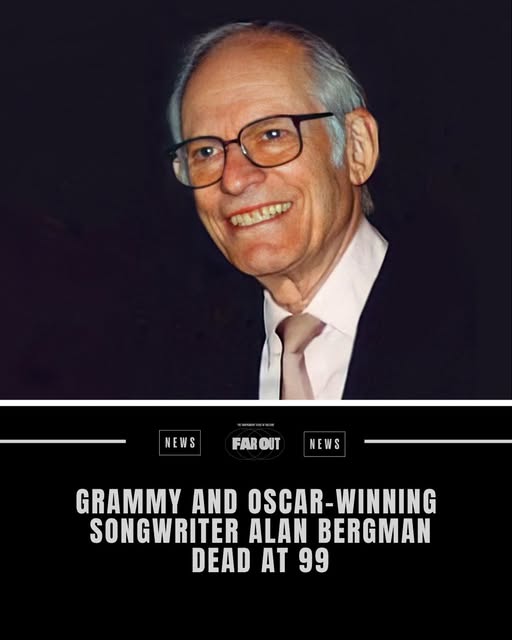A Farewell to a Lyric Legend: Alan Bergman Dies at 99
The world of music and film lost one of its most iconic voices as Alan Bergman, the Oscar-winning lyricist known for his deeply moving and timeless songs, passed away peacefully at the age of 99. His death not only marks the end of a personal journey, but also the closing chapter of an era defined by lyrical elegance, Hollywood glamour, and the unmistakable magic of storytelling through song.
Alongside his wife and lifelong writing partner, Marilyn Bergman, Alan crafted some of the most beloved songs in film and music history. Together, they were the heart and soul behind unforgettable classics like “The Way We Were”, “You Don’t Bring Me Flowers”, and “What Are You Doing the Rest of Your Life?” These weren’t just songs; they were poetry set to melody—verses that echoed through the decades and nestled into the memories of millions.
The Man Behind the Magic: A Humble Genius
Born on September 11, 1925, in Brooklyn, New York, Alan Bergman’s musical journey began with a dream as modest as it was profound: to communicate emotion. He studied music at UCLA and eventually pursued lyric writing full-time—a calling that would lead him into the orbit of some of the greatest talents of the 20th century.
What set Alan apart wasn’t just his mastery of rhyme or rhythm—it was his understanding of human connection. He believed that a great lyric should not only match the music, but elevate it. His words didn’t just accompany the notes; they gave them a voice.
A Love and Collaboration for the Ages
Alan’s partnership with Marilyn Bergman was not only personal—it was symphonic. Married in 1958, the couple became one of the most celebrated songwriting duos in history. Their partnership lasted over six decades and yielded multiple Oscars, Golden Globes, and Grammys. Yet beyond the accolades was a love story rooted in respect, creativity, and shared vision.
The Bergmans had an almost telepathic connection. Often, one would begin a line and the other would finish it. This fusion of minds and hearts gave rise to lyrics that transcended genre and generation. Whether penning tender ballads for Barbra Streisand or weaving introspective lyrics for Michel Legrand, their songs always bore the hallmark of sincerity.
“The Way We Were”: A Cultural Touchstone
Of all their accomplishments, none perhaps captured the public’s imagination quite like “The Way We Were.” Released in 1973 and sung hauntingly by Barbra Streisand, the song became an instant classic. Its melancholy nostalgia and evocative lyrics tapped into a collective yearning, a sense of beauty tinged with sorrow.
“Memories, light the corners of my mind…”
That opening line alone has lived on as one of the most recognizable in popular music. It earned the Bergmans an Academy Award and cemented their place in Hollywood’s golden pantheon. Even decades later, the song remains a cultural reference point—a musical monument to love, loss, and memory.
A Champion of the Creative Arts
Alan Bergman wasn’t just a lyricist; he was a passionate advocate for artists. He served as the president of ASCAP (American Society of Composers, Authors and Publishers) from 1985 to 1994, fighting for musicians’ rights and fair compensation in an industry often slow to reward its creative engine.
In this role, he worked tirelessly behind the scenes to ensure that songwriters received the recognition—and the royalties—they deserved. He believed deeply in the sanctity of intellectual property and stood firm in an evolving music landscape.
Tributes from a Grateful Industry
News of Alan Bergman’s death sparked an outpouring of tributes from across the entertainment world. Barbra Streisand, a close friend and frequent collaborator, expressed her heartbreak:
“Alan was a poet of the soul. He gave voice to feelings we didn’t know we had until we heard his lyrics. He and Marilyn were my mentors, my collaborators, my family.”

Songwriters, composers, actors, and directors shared stories of Alan’s generosity, humor, and gentle spirit. Many spoke of how his words had shaped their careers, inspired their art, or comforted them during life’s more turbulent moments.
Beyond the Silver Screen
While many of Alan’s best-known works were crafted for film, his reach extended well beyond Hollywood. He and Marilyn wrote for television, Broadway, and popular artists, leaving an indelible mark on every platform they touched.
Hits like “You Don’t Bring Me Flowers”—famously recorded by Neil Diamond and Barbra Streisand—topped the charts and brought millions to tears. Songs like “How Do You Keep the Music Playing?” became wedding staples and love anthems. Each lyric they penned was rich in emotional texture, never contrived, always authentic.
A Legacy That Will Never Fade
What makes Alan Bergman’s legacy so enduring is the intimacy of his art. He didn’t write for trends or fame—he wrote to communicate. His songs spoke to the human condition in a voice that was universal, yet unmistakably personal.
In an era of fast consumption and fleeting attention, Alan’s lyrics invited listeners to pause, reflect, and feel. They were a gentle nudge toward vulnerability—a reminder that it’s okay to remember, to hope, to mourn, and to dream.
Though he is gone, his words remain.
A Personal Goodbye from the World
As Alan Bergman is laid to rest, the world doesn’t just say goodbye to a songwriter—it says goodbye to a chronicler of love, loss, and life. He gave us more than music; he gave us meaning. His work wasn’t just heard—it was felt.
For every person who danced to one of his songs at their wedding, cried to one during heartbreak, or hummed a verse while chasing a dream, his death feels deeply personal.
But in every tear shed and every melody replayed, Alan Bergman lives on.
Final Notes: A Call to Remember
In a time when the arts are often undervalued, the life of Alan Bergman reminds us of the transformative power of music and words. His lyrics taught generations how to speak their hearts. Now, it’s our turn to honor his legacy—not just by playing his songs, but by listening with the same care and emotion that he poured into every line.
He was 99. He gave us nearly a century of beauty.
And what are we doing the rest of our lives? Remembering him.
✨ Let the Music Live
In tribute to Alan Bergman, spend a moment today listening to a song that once moved you. Let the lyrics speak again. Sing them aloud. Pass them down. Share them.
Because as long as we remember the words, the man who wrote them never really dies.

